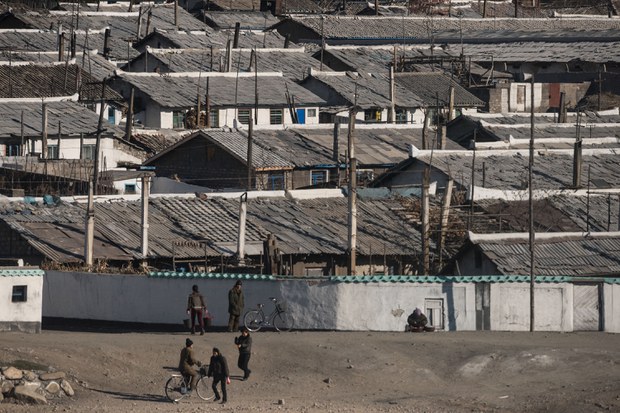To boost hygiene, North Korea bans outhouses, orders public toilet construction
Share

In North Korean villages with single-story houses, such as the one in this file photo, there are communal toilets for every two or three neighborhood units.
In an effort to improve hygiene, North Korean authorities are ordering residents outside the capital to demolish their private outhouses and upgrade or construct public toilets – at their own expense, sources in the country told Radio Free Asia.
But people are complaining that the plan makes no sense because communal toilets are less hygienic than outhouses, which each family maintains, and that the government should instead focus on tackling more basic needs, like improving living conditions and repairing homes damaged by natural disasters such as typhoons, the sources say.
“People do not have enough food to eat because of the hardships of living due to the coronavirus. They are living in leaky houses and can’t even think about repairing them,” a resident of the city of Tokchon in the northwestern province of North Pyongan told RFA’s Korean Service on condition of anonymity for fear of getting punished for speaking out.
Outside of the capital Pyongyang, very few homes in North Korea have individual toilets. People who live in apartments often use communal toilets with their neighbors, and in rural areas, residents build outhouses detached from their homes.
Communal toilets in these areas are usually shared between two or three neighborhoods, but authorities have ordered that rural residents work together to renovate them, or build new ones.
“Last week, residents in Songchon county were mobilized to demolish the village’s common toilet and expand and build a new one there,” said a resident of the county in South Pyongan province, north of Pyongyang.
The construction costs must be covered by the residents themselves, he said.
Authorities have called a meeting of each neighborhood watch unit, and ordered that every home with an outhouse must demolish it and use the new public toilet, the source said. Residents were told that if each house uses a separate outhouse, the village environment will be polluted, he said, explaining that during the rainy season, the sewage flows out of these outhouses, creating a stench and causing water-borne contagious diseases to spread.
Manure quota
Residents also complain that the plan is not only a huge hassle, it deprives them of fertilizer for their home gardens, and makes it harder for them to fulfill yearly government manure collection quotas for use in communal farming.
RFA reported in January 2019 that authorities ordered every able-bodied citizen to collect an impossible 100 kilograms (220 pounds) of manure per day. In October of that year, fights broke out in public bathrooms as citizens laid claim to the human waste therein.
Orders for manure collection go out every year, and sources have said that the government’s quota is unreasonably high because the true purpose is to get the citizens to pay a fine for not collecting their share.
With no more outhouses, residents have no reliable source of human waste at collection time.
“It is considered the same as cash,” the Tokchon source said. “It will be difficult for the authorities to succeed in forcing the use of communal toilets.”
Translated by Claire Shinyoung Oh Lee. Written in English by Eugene Whong. Edited by Malcolm Foster.







